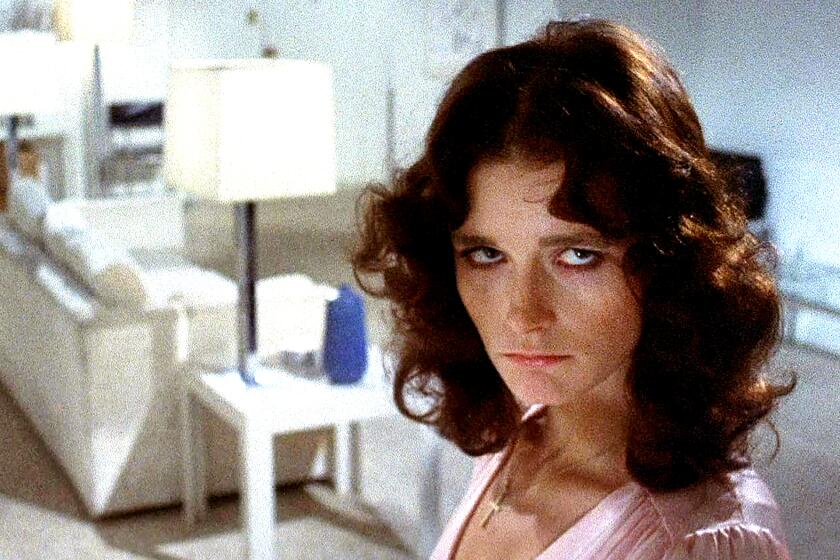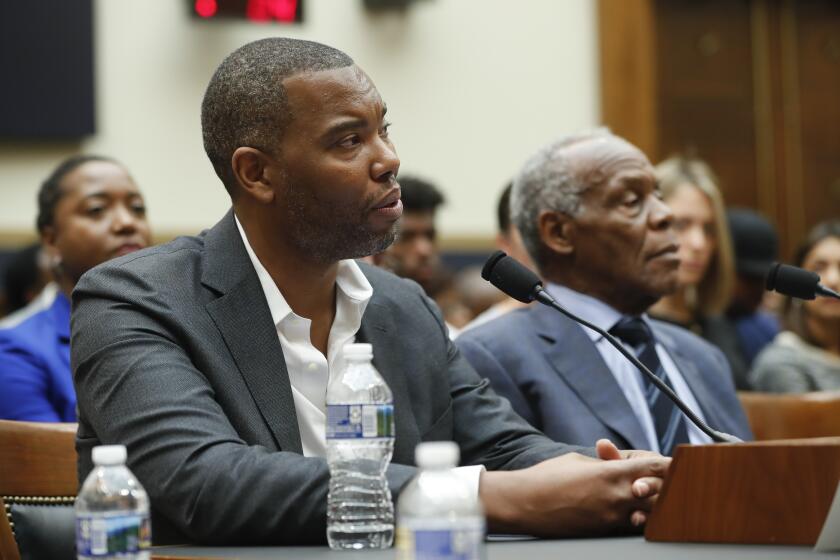Eric Roberts has no use for fame anymore. He just wants to work

On the Shelf
Runaway Train
By Eric Roberts
St. Martin’s Press: 304 pages, $30
If you buy books linked on our site, The Times may earn a commission from Bookshop.org, whose fees support independent bookstores.
The entertainment industry is facing an existential crisis, with less content being produced and far fewer jobs for the taking. Fortunately, Eric Roberts got wise to this state of affairs well before anyone else did, even before we binged TV shows as a source of pride. “They now give you no time to rehearse and they pay you less,” says Roberts, who is best known for his live-wire films. “You can’t sit around and wait for the big paycheck anymore.”
As Roberts writes in his new memoir, ”Runaway Train: Or, the Story of My Life So Far” — out now — he leaned hard into this new normal years before everyone else was scrambling for scarce jobs. Roberts too feels that pinch, which is why he “says yes to everything.” “We are often overdrawn, broke and scared. I know people who were in the cast of ‘Titanic’ [who] can’t pay their rent,” Roberts writes in his memoir.
But Roberts has no use for fame anymore; he just wants to work. In the book, which Roberts wrote with journalist and novelist Sam Kashner, he boasts of having 750 credits on his IMDb page. By the time he sat down for this interview in August, that credit list had ticked up to nearly 850. “I’m an actor, first and foremost,” he says. “Everything else is secondary.”

A standout among a generation of New York theater actors who transitioned into film in the 1970s, Roberts burst into public consciousness in Bob Fosse’s 1983 biopic “Star 80” as Paul Snider, the homicidal husband of Playboy playmate Dorothy Stratten (portrayed by Mariel Hemingway). Roberts dissolved into his character, a manipulative small-time hustler whose self-hatred metastasizes into murderous rage.
Other high-profile roles followed, such as fugitive Buck McGeehy in Andrei Konchalovsky’s 1985 action thriller “Runaway Train.” The actor received an Oscar nomination for that role, and it transported him onto talk-show couches and tabloid covers. Flush and feeling himself, Roberts bought a penthouse apartment on Manhattan’s Upper East Side and a house in Greenwich, Conn. He also began to abuse cocaine. In time, he would lose the apartment and the house; the drugs remained.
But “Runaway Train” the book is not some weepy expiation for past sins, a Hollywood reclamation job designed to kick-start a once-buzzy career. Roberts knows all too well that he has made horrible choices, that his erratic behavior damaged his relationships with friends and family, including his sister Julia Roberts (their relationship remains touch and go; he avers that “we have agreed not to talk about each other’s careers.”) Still, Hollywood lore is lousy with addicts who have thrived despite their bad habits, and for a while, Roberts walked the tightrope.
Pedro Almodóvar’s first book consists of a mix of short stories and personal essays that amount to ‘a fragmentary autobiography.’
As Roberts describes in cringey detail in the book, his fall from grace came a little bit at a time, then all at once. He consistently wrested defeat from the jaws of victory, arguing himself out of acting roles with Quentin Tarantino and Oliver Stone, among others. “I was high when I showed up for my audition with Ron Howard,” says Roberts.
Roberts was an erratic maniac, no doubt, but much of what he learned about the dark arts of self-immolation came from his father, Walter, a screenwriter during the glory days of radio drama who then started his own theater in Atlanta, where Roberts was raised. A bitter, arrogant striver, Walter encouraged his son to act, only to savagely criticize him when he did so, which confused and angered his son.
Roberts’ father was a small-time grifter and once tried to enlist him to rob a pharmacy for much-needed cash. At night, Roberts’ mother frequently beat him with a dowel. Blessed relief from the lash of the dowel came when Roberts’ parents split. Walter was awarded custody of Roberts; sisters Julia and Lisa went to live with their mother. Walter continued to whittle his son down to size. “My father taught me a lot about the process of being a professional actor, but he would denigrate me at every turn,” says Roberts. “As a kid it was very difficult. How do you deal with a father like that? It was hard to process.”
Even when Roberts somehow scraped up the money to move to New York, his father continued to hound him with an endless stream of letters in which he would alternately browbeat him as an underachieving mediocrity, praise his talent, ask for money and accuse him of abandonment. “I was still getting thousands of letters,” says Roberts. “I still have them. It was insane, dude! Eventually, I realized you have to love people for who they are, but you can’t let them walk all over you. Even when it was sincere and loving, it felt misplaced and mean.”
In ‘The De Palma Decade,’ Laurent Bouzereau’s unabashed adoration of director Brian De Palma can be a hindrance to deeper understanding.
Despite this epistolary “mind control,” Roberts soldiered on, landing his first TV gig in 1977 on the soap opera “Another World.” Roberts’ smoldering, high-beam intensity caught the attention of Joe Papp, a panjandrum of New York theater who cast Roberts in a Public Theater production of the Civil War drama “Rebel Women.” Roberts earned his Actors’ Equity card, then scored his first film role as Dave Stepanowicz, the scion of a New York crime family, in 1978’s “King of the Gypsies.”
Yet even as Roberts was endearing himself to a wider audience, he was enraging directors with his insistence on staying in character 24/7. “I would yell at people for no reason, lock myself in the trailer and violently kick the door from the inside,” Roberts writes about “Star 80.” “I began manifesting [Snider] to the point that it was imperiling the entire production and infuriating Fosse.”
After that, it was hard to shake the “problem actor” label, especially given the hair-trigger eccentrics he was manifesting so convincingly on film. Roberts’ drug addiction did little to help his cause. “Blow was everywhere,” he says. “I mean, you go to the prop truck on a set and they would have a big bowl of cocaine for everyone. How could I get any work done?”

Roberts’ private and public lives converged, as if he were using Stanislavski’s sense memory in reverse, conjuring up weird scenes from his films as material for his personal use. His stepson Keaton, whom Eric helped raise, moved out as a teenager, unnerved by Roberts’ erratic and often violent behavior. In 1995, Roberts was arrested for shoving his wife, Eliza, against a wall.
Suffice to say, he didn’t walk into rehab; a court order got him there, for 18 months.
When he emerged, somewhat purged of his own self-hate, Eliza was waiting for him. She pulled him up, brushed him off and transitioned him into a life where he would sublimate his addictive impulses into steady work. She is Roberts’ manager and consigliere, and the pairing has paid off nicely. This year alone, Roberts has acted in 73 productions — a western miniseries, a few low-budget sci-fi films and something called “My Redneck Neighbor: Chapter 1 — The Rednecks Are Coming.” He’s also a contestant on the new season of “Dancing With the Stars,” premiering Tuesday.
And Keaton came back. A singer-songwriter and TV and film composer, he has subsequently worked with Roberts. As for Emma, Roberts’ daughter with former partner Kelly Cunningham, Roberts says, considering that they haven’t been involved in each other’s lives and don’t communicate with each other that much, their relationship is “cordial and supportive, but not close.”
Given how many times Roberts has tried to sabotage his life and his career, he is well aware that it could have gone the other way. “I’m not sure how all this worked out for me, honestly,” he says. “If it weren’t for my wife, I might have been dead by now. I know that sounds dramatic, but it’s a fact.”
Eric Roberts will be signing copies of his memoir, “Runaway Train,” at 7 p.m. Sept. 25 at Barnes & Noble at the Grove in L.A.
More to Read
Sign up for our Book Club newsletter
Get the latest news, events and more from the Los Angeles Times Book Club, and help us get L.A. reading and talking.
You may occasionally receive promotional content from the Los Angeles Times.








